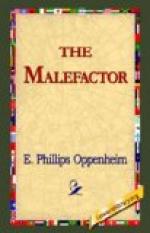“But after all,” he said, “I can assure you that you will find very little in the Mr. Wingrave of New York to remind you of the past. I shall do my utmost to win for myself a place in your esteem, which will help you to forget the other relationship, which, if my memory serves me, used once to exist between us!”
She raised her head. Either she realized that, for the present, the man was immune against all sentiment, or his calm brutality had had a correspondingly hardening effect upon her.
“If I agree,” she said, “will you give me back my letters?”
“No!” he answered.
“What are you going to do with them?”
“It depends,” he said, “upon you. I enter into no engagement. I make no promises. I simply remind you that it would be equally possible for me to take my place in the world as a rehabilitated Wingrave Seton. Ten years ago I yielded to sentiment. Today I have outlived it.”
“Ten years ago,” she murmured, “you were a hero. God knows what you are now!”
“Exactly!” he answered smoothly. “I am free to admit that I am a puzzle to myself. I find myself, in fact, a most interesting study.”
“I consent,” she said, with a little shudder. “I am going now.”
“You are a sensible woman,” he answered. “Aynesworth, show Lady Ruth to her carriage.”
She rose to her feet. Hung from her neck by a chain of fine gold, was a large Chinchilla muff. She stood before him, and her hands had sought its shelter. Timidly she withdrew one.
“Will you shake hands with me, Wingrave?” she asked timidly.
He shook his head.
“Forgive me,” he said; “I may better my manners in America, but a present I cannot.”
She passed out of the room. Aynesworth followed, closing the door behind them. In the corridor she stumbled, and caught at his arm for support.
“Don’t speak to me,” she gasped. “Take me where I can sit down.”
He found her a quiet corner in the drawing room. She sat perfectly still for nearly five minutes, with her eyes closed. Then she opened them, and looked at her companion.
“Mr. Aynesworth,” she said, “are you so poor that you must serve a man like that?”
He shook his head.
“It is not poverty,” he answered. “I knew his history, and I am interested in him!”
“You write novels, don’t you?” she asked.
“I try,” he answered. “His story fascinated me. He stands today in a unique position to life. I want to see how he will come out of it.”
“You knew his story—the truth?”
“Everything,” he answered. “I heard it from a journalist who was in court, his only friend, the only man who knew.”
“Where is he now?”
“On his way to Japan.”
She drew a little breath between her teeth.
“There were rumors,” she said. “It was hard for me at first, but I lived them down. I was very young then. I ought not to have accepted his sacrifice. I wish to heaven I had not. I wish that I had faced the scandal then. It is worse to be in the power of a man like this today! Mr. Aynesworth!”




